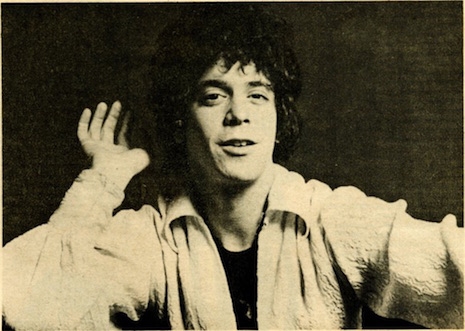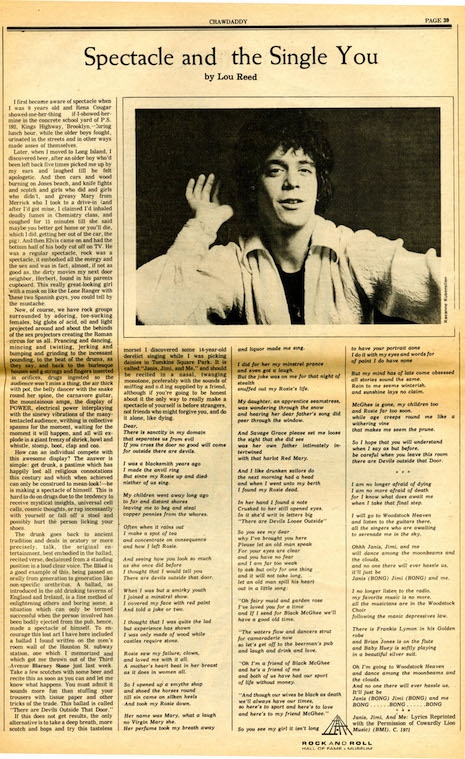
In the July 4, 1971, issue of Crawdaddy there appears a most curious article authored by Lou Reed, recently of the Velvet Underground, on the subject of spectacle. This poem appeared during one of the most interesting phases for Reed, after his departure from Velvet Underground but before his trip to London to record his first solo album with Rick Wakeman and Steve Howe, among others. Months before that solo album appeared on the horizon and having recently worked in his father’s accounting firm, in the spring of 1971 Reed might well have thought of himself as a “former” rock musician and more of a poet, or a hybrid of the two.
As a rock and roll musician, Reed, in the prose section of this Crawdaddy contribution, understandably isolates “spectacle” as the terrain dominated by big, famous rock groups with large-scale, expensive stage shows, what was surely the state of the art in spectacle at that moment. Is there any envy in these words, or more like an avant-garde artist’s insistence on the values of a smaller coterie?
Prancing and dancing, mincing and twisting, jerking and bumping and grinding to the incessant pounding, to the beat of the drums, as they say, and back to the burlesque houses and g-strings and fingers inserted in orifices, drugs ingested so the audience won’t miss a thing, the air thick with pot, the belly dancer with the snake round her spine, the carnavore guitar, the mountainous amps, the display of POWER, electrical power interplaying with the sinewy vibrations of the many-tentacled audience, writhing in collective spasms for the moment, waiting for the moment it will happen, and all will explode in a giant frenzy of shriek, howl and whistle, stomp, boot, clap and coo.
From this slightly contemptuous portrayal of big expensive showbiz (so very Greenwich Village of him), Reed then transitions to the question of what is the version of that spectacle scaled down to the level of the individual, rather than the group, and concludes that the natural representative of spectacle is ... the town drunk. Reed argues that the aimless patter of the dipsomaniac harks back to the oral tradition as embodied by The Iliad, and from there to the ballad as “a fine method of enlightening others and boring some, a situation which can only be termed successful when the person involved has been bodily ejected from the pub, hence, made a spectacle of himself.”
Tongue lodged firmly in cheek, Reed tells of a “ballad I found written on the men’s room wall of the Houston St. subway station,” which he claims to have memorized and intoned at “the Third Avenue Blarney Stone,” an act that caused him to be ejected from the premises. The title of that ballad is “There Are Devils Outside That Door.” Then, confusingly, Reed then switches from that song to a second “tasteless morsel” called “Janis, Jimi, and Me” that he discovered a “14-year-old derelict” singing in Tompkins Square Park. Reed insists that it should be “recited in a nasal, twanging monotone, preferably with the sounds of sniffing and o.d.ing supplied by a friend.”
The article ends with that ballad, a long one, with thirty verses, most of them quatrains, a poem with what appears to be two titles (both titles would fit the material equally well), a poem to which Reed assigns two different provenances (subway graffiti & the teenage derelict). Reed was working overtime to obscure his authorship of this bitter little piece of versification.
But here’s the strangest aspect of this bit of poetry: I can’t find the merest reference to it on the Internet, and that includes any reference to the Crawdaddy prose section, which is entitled “Spectacle and the Single You.” By “Google” I am also referring to plenty of full-length books about Reed and VU, of course, although that investigation is necessarily incomplete. If anyone out there is aware of this Reed composition, they’re doing an excellent job of concealing it. I couldn’t find any of the titles associated with this article in conjunction with Reed, and I also couldn’t find several of the lyrics when entered into Google as a string.
The poem itself is written in an “old-timey” mode, something akin to an Irish drinking song or a pirate shanty, or both. The poem, if it means anything, is about the perils of the local wastrel taking his or her gift for spectacle on the road in search of a wider audience, i.e. rock superstardom. The poem is about a blacksmith who joins “a minstrel show” and betrays his beloved Rosie with “that harlot Red Mary.” Eventually the poem segues to the subject of Woodstock—the spectacle to end all spectacles—and ends as a kind of joyous death dirge, complete with gongs being chimed (BONG), for the untimely demise of Janis Joplin and Jimi Hendrix, who had died about a year before this poem saw publication.
What to make of it? Now, I’m completely ready to accept this as a Lou Reed composition. There’s only one detail that seems out of place, and that is the copyright credit after the poem, which reads, “Lyrics Reprinted with the Permission of Cowardly Lion Music.” Which is supposed to mean one of two things, that “Cowardly Lion Music” is a reference to Reed’s publishing company or that this song had appeared in a musical or something. Again, Google was no help.
It’s difficult for me to credit Lou Reed actually seeing Jimi and Janis with an un-jaundiced eye, but I wouldn’t have necessarily guessed that Reed would have written “Jesus” either, if all I knew about him was “Walk on the Wild Side” and “I’m Waiting for the Man.” The poem is in that old-timey register, which doesn’t seem all that Reed-ish, and its apparent valorization of Hendrix and Joplin is double-edged at a minimum.
Dear,
There is sanctity in my domain
that separates us from evil
If you cross the door no good will come
for outside there are devils.I was a blacksmith years ago
I made the anvil ring
But since my Rosie up and died
niether of us sing.My children went away long ago
to far and distant shores
leaving me to beg and steal
copper pennies from the whores.Often when it rains out
I make a spot of tea
and concentrate on consequence
and how I left Rosie.And seeing how you look so much
as she once did before
I thought that I would tell you
There are devils outside that door.When I was but a smirky youth
I joined a minstrel show.
I covered my face with red paint
And told a joke or two.I thought that I was quite the lad
but experience has shown
I was only made of wood while
castles require stone.Rosie saw my failure, clown,
and loved me with it all.
A mother’s heart beat in her breast
as it does in women all.So I opened up a smythe shop
and shoed the horses round
till sin came on silken heels
And took my Rosie down.Her name was Mary, what a laugh
no Virgin Mary she.
Her perfume took my breath away
and liquor made me sing.I did for her my minstrel prance
and even got a laugh.
But the joke was on me for that night of stealth
snuffed out my Rosie’s life.My daughter, an apprentice seamstress,
was wandering through the snow
and hearing her dear father’s song did
peer through the window.And Savage Grace please set me loose
the night that she did see
was her own father intimately intertwined
with that harlot Red Mary.And I like drunken sailors do
the next morning had a head
and when I went unto my berth
I found my Rosie dead.In her hand I found a note
Crushed to her still opened eyes.
In it she’d writ in letters big
“There are Devils Loose Outside”So you see my dear
why I’ve brought you here
Please let an old man speak
For your eyes are clear
and you have no fear
and I am far too weak
to ask but only for one thing
and it will not take long,
let an old man spill his heart
out in a little song:“Oh fairy maid and garden rose
I’ve loved you for a time
and if I send for Black McGhee we’ll
have a good old time.“The waters flow and dancers strut
for camaraderie now
so let’s get off to the beerman’s pub
and laugh and drink and love.“Oh I’m a friend of Black McGhee
and he’s a friend of me
and both of us have had our sport
of life without money.“And though our wives be black as death
we’ll always have our times,
so here’s to sport and here’s to love
and here’s to my friend McGhee.”So you see my girl it isn’t long
to have your portrait done
I do it with my eyes and words for
of paint I do have noneBut my mind has of late come obsessed
all stories sound the same.
Rain to me seems winterish
and sunshine lays no claim.McGhee is gond, my children too
and Rosie far too soon.
while age creeps round me like a withering vine
that makes me seem the prune.So I hope that you will understand
when I say as but before,
be careful when you leave this room
there are Devils outside that Door.* * *
I am no longer afraid of dying
I am no more afraid of death
for I know what does await me
when I take that final step.I will go to Woodstock Heaven
and listen to the guitars there,
all the singers who are waiting
to serenade me in the sky.Ohhh Janis, Jimi, and me
will dance among the moonbeams and the clouds,
and no one there will ever hassle us,
it’ll just be Janis (BONG) Jimi (BONG) and me.I no longer listen to the radio,
my favorite music is no more,
all the musicians are in the Woodstock Choir
following the manic depressives law.There is Frankie Lymon in his Golden robe
and Brian Jones is on the flute
and Baby Huey is softly playing
in a beautiful silver suit.Oh I’m going to Woodstock Heaven
and dance among the moonbeams and the clouds.
And no one there will ever hassle us,
It’ll just be Janis (BONG) Jimi (BONG) and me.
BONG . . . . . .BONG . . . . .BONGJanis, Jimi, And Me: Lyrics Reprinted with the Permission of Cowardly Lion Music) (BMI). C. 1971
Here’s the page from Crawdaddy; you can see a larger version by clicking on this image.

I found this issue of Crawdaddy at the Rock Hall’s Library and Archives, which is located at the Tommy LiPuma Center for Creative Arts on Cuyahoga Community College’s Metropolitan Campus in Cleveland, Ohio. It is free and open to the public. Visit their website for more information.